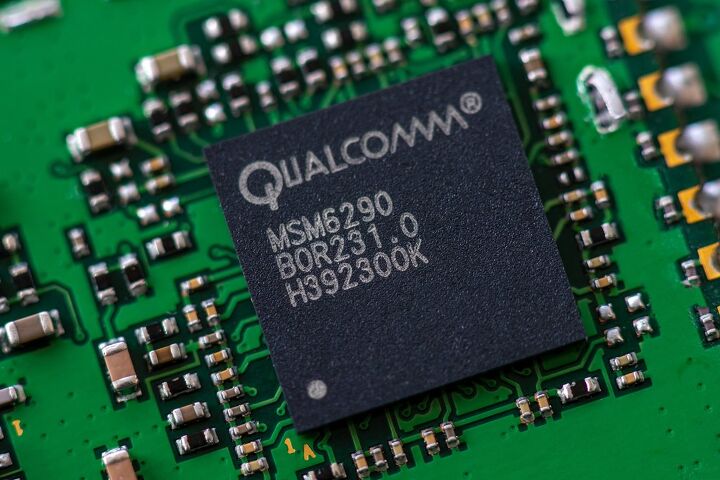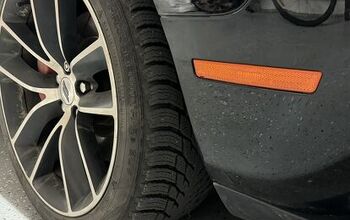Qualcomm Launches One Automotive Chip to Rule Them All

Qualcomm has released a new automotive processor chip designed to help contend with supply chain issues by handling both driver assistance features and the more standard functions tied to the infotainment system.
Typically those systems are handled by separate semiconductors. But Qualcomm believes that the Snapdragon Ride Flex SoC will be able to handle basic functions and multimedia while also serving as the core processor for any driving aids tied to vehicle sensors. In theory, automakers would only have to purchase a single chip – with Qualcomm receiving their business by offering a relatively simple way for them to cut costs and reduce manufacturing complexity.
Nakul Duggal, Qualcomm’s head of automotive, explained the premise to Reuters – noting that the chip was already being tested out by clients and would become commercially available in 2024.
“Obviously you are reducing the number of physical boxes. So, it goes down to a single box. You reduce the amount of memory that you need. The extra external components that you need, those go down,” Duggal said.
Qualcomm previewed the chip at this year’s CES (though it had technically been announced before), stating that it builds on the technology of the older Snapdragon Ride platform that’s currently embedded into Cadillac’s Lyriq EV. While that unit is focused on advanced driving aids, the company likewise offers Snapdragon Cockpit chips that handle infotainment systems and connectivity. The Snapdragon Ride Flex SoC is supposed to offer the best of both worlds by handling all of the above independently.
This has the potential to link all vehicle controls through a single centralized computer, rather than having a series of dedicated systems tied to ECUs. That likewise means automakers can get away with less wiring, saving on their copper bills. Moving functionality into a centralized platform is also supposed to make it much easier to do over-the-air software updates and provide automakers with more comprehensive data about the vehicle.
Though not all of the above will appeal to you if you happen to be someone who doesn’t want their vehicle permanently connected to the internet. Do-it-yourself types will also probably not appreciate having everything integrated into one system that’s effectively controlled by the manufacturer.
Considering this was the direction much of the industry was heading anyway, with companies like Nvidia working on similar chips, Qualcomm seems to be positioning itself wisely and said its latest unit would be scalable to handle bigger computing jobs. Though this could require upgraded or additional chips, depending on the automaker’s needs. Assuming the industry likes what it sees, expect to see the first batch showing up in electric vehicles produced by BMW or Volkswagen after 2024.
[Image: Remus Rigo/Shutterstock]
Become a TTAC insider. Get the latest news, features, TTAC takes, and everything else that gets to the truth about cars first by subscribing to our newsletter.

A staunch consumer advocate tracking industry trends and regulation. Before joining TTAC, Matt spent a decade working for marketing and research firms based in NYC. Clients included several of the world’s largest automakers, global tire brands, and aftermarket part suppliers. Dissatisfied with the corporate world and resentful of having to wear suits everyday, he pivoted to writing about cars. Since then, that man has become an ardent supporter of the right-to-repair movement, been interviewed on the auto industry by national radio broadcasts, driven more rental cars than anyone ever should, participated in amateur rallying events, and received the requisite minimum training as sanctioned by the SCCA. Handy with a wrench, Matt grew up surrounded by Detroit auto workers and managed to get a pizza delivery job before he was legally eligible. He later found himself driving box trucks through Manhattan, guaranteeing future sympathy for actual truckers. He continues to conduct research pertaining to the automotive sector as an independent contractor and has since moved back to his native Michigan, closer to where the cars are born. A contrarian, Matt claims to prefer understeer — stating that front and all-wheel drive vehicles cater best to his driving style.
More by Matt Posky
Latest Car Reviews
Read moreLatest Product Reviews
Read moreRecent Comments
- 28-Cars-Later "Around half of that money comes from the Department of Energy to help internal combustion engine suppliers retool to make EV parts."So, pay them to dispose of their current presses/equipment to choke future parts availability, then most of them become insolvent when EV doesn't happen. Brilliant!"Another $50 million provides grants of up to $300,000 for the companies to make their factories greener and improve cybersecurity.""$300K isn't squat to renovate anything in an actual factory or hire new SecOps folks/add to an IT dept (best I can think of is some developer training/conferences on more secure coding). Depending on how one would qualify, this is either a bribe to the owners so they'll dance whatever tune comes out of Washington, or just free money to selected parties (i.e. subservient to D.I.E.).FJB - May he live at least another 40 years in the most excruciating pain possible.
- Kwik_Shift_Pro4X Auto Stop/Start is useless. If you want it, great, but it should be an option within a package. Same with those satellite stations. Just leave it off my head unit and give me AM radio and a USB port for my own music collection.
- Doc423 Question to EV/Tesla owners : how long will a Tesla or EV hold a charge on it's battery when it sits for months, especially, like here, outdoors in all weather conditions??
- Doc423 Would LOVE to see the laws changed here in the U.S. and see may of these sleezebags get jail time, including Dealers.
- 28-Cars-Later [list=1][*]Real bumpers.[/*][*]Visibility.[/*][*]Buttons. [/*][*]CD Players.[/*][*]Headlamp brightness limiter.[/*][*]Das internet ist verboten - but phone connections are not banned.[/*][/list=1] 6a. In this way users can choose to link their "phone" to the auto. 6b. If a user simply chooses to not do so, E.T. cannot phone home. 6c. Most will consent to a "phone" link up but there's now an opt out. EDIT: 7. Immediate layoff of 50% of employees of NHSTA, Federal DOT, EPA, and CARB.


































Comments
Join the conversation
Too bad the ARM v QUALCOMM lawsuit might trash the entire lineup.
The trend is to combine more functions with 1 chip and I don't believe the auto makers have any choice because the older chips are being phased out. Auto companies will pay more for the chips but use less of them making the chips more profitable for the chip makers. The only alternative would be if the auto makers made their own chips in order to have an adequate supply of the older generation chips but the trend for a number of years is that the auto companies have been outsourcing more of their parts. This might be the only way auto companies can get an adequate supply of chips to make enough vehicles without cutting output of vehicles. The auto companies probably have no other options. As has been stated in the past the dealers are the manufacturers customers not the consumer and the dealers need more vehicles to sell.